Living With Wisdom Teeth
Many people live with their wisdom teeth all their lives. However, many others undergo wisdom teeth removal to help keep their mouths healthy and comfortable. With so many opportunities to experience wisdom teeth pain, many professionals recommend that patients have their impacted wisdom teeth extracted before their quality of life is affected. Here, Rutgers Health University Dental Associates reviews some of the realities of living with wisdom teeth, as well as the steps you can take to alleviate any complications.
What Are Wisdom Teeth?
According to an array of scholars, wisdom teeth seem to have formed as an evolutionary response to eating raw meats, vegetables, and roots. Typically, this third set of molars fully develops when we are between 17 and 21 years old. Since they don’t always pose a benefit, it’s generally recommended that patients undergo wisdom teeth removals when they are between the ages of 16 and 19. In some cases, patients’ wisdom teeth have:
- Become impacted
- Grown incorrectly
- Been causing pain
- Been affected by another form of dysfunction
- Cause development of pathology such as cysts or tumors of the jaws
- Responsible for periodontal defects affecting adjacent teeth
Living with Wisdom Teeth
Although living with wisdom teeth won’t always pose problems, several complications have a chance to arise. These include, but are not limited to, the following:
Impacted Wisdom Teeth
When a wisdom tooth becomes impacted, this means that it doesn’t have enough room to properly sprout from the gums and develop. Thus, you might experience jaw pain, swollen, tender, or bleeding gums, bad breath, difficulty opening your mouth, and more. Other patients might not experience any symptoms, making it incredibly important to receive regular, routine dental care to spot these issues and stop them in their tracks.
Improper Growth
When wisdom teeth grow improperly, this often means that they’ve taken up too much space in your mouth or there may not be enough space for them to erupt into the oral cavity. Since they’re so far back, these teeth cannot be straightened or spaced out with braces. Rather, the only way to remedy atypical wisdom teeth is to have them removed.
Wisdom Teeth Pain
As you might’ve guessed, wisdom teeth can cause pain and discomfort when they grow in, whether it’s because they’re impacted or another developmental issue. Sometimes, this pain will go away over time. But in other cases, extraction is the ideal, permanent way to treat it.
Difficulty Eating
Whether it’s due to impaction or another issue, food can become trapped in between your wisdom teeth when you eat. And when these teeth aren’t properly spaced, it can be that much more difficult to floss or brush between them. When they put your dental health in jeopardy, many dental providers will recommend wisdom teeth removal for an easy, effective fix.
Sinus Issues
This next wisdom-teeth-related issue might surprise you: sinus problems. When wisdom teeth grow in along your upper jaw, they can put an uncomfortable amount of pressure on your sinuses. Although this issue is on the rarer side, extractions are typically recommended to alleviate the associated sinus pain, pressure, headaches, and congestion.
Find Out How We Can Help
As you’ve seen, a highly effective way to eliminate wisdom teeth pain and other complications are to have them completely removed. Luckily for residents of New Brunswick, Newark, and neighboring New Jersey communities, the general dentistry and specialty team at Rutgers Health University Dental Associates can help alleviate these issues once and for all. To learn more about our wisdom teeth extraction and other oral surgery services, schedule an appointment today.



